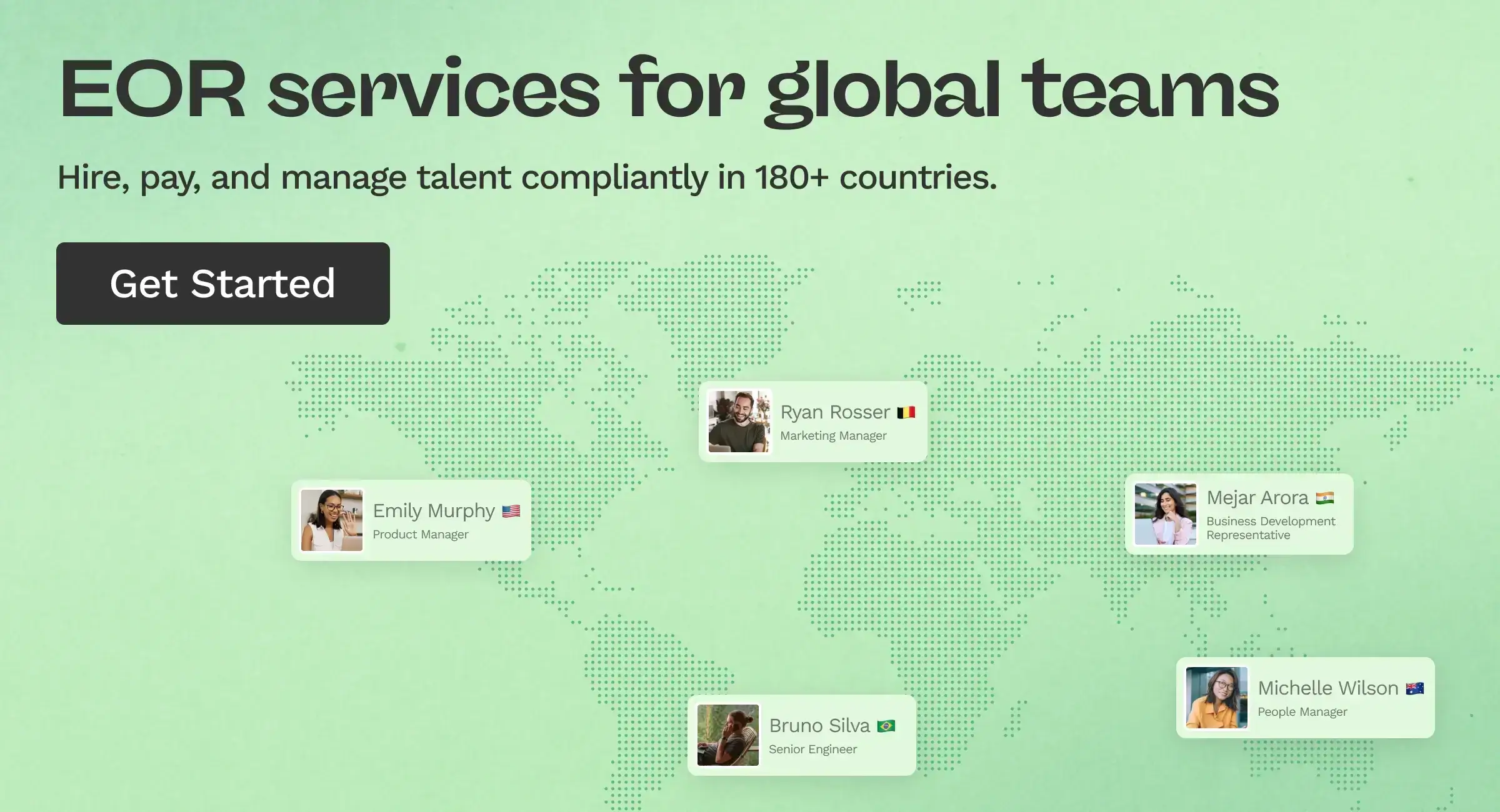As your team grows, so does the HR workload. A Professional Employer Organization (PEO) helps ease that burden by managing payroll, benefits, and compliance on your behalf. The best ones make scaling smoother—especially if you’re hiring across borders.
Let’s dive into the best PEO services and discover how to choose one that grows with you.
What’s PEO?
A PEO is a full-service HR partner that shares certain employer responsibilities through a co-employment model. The PEO handles administrative functions, while the client company continues to run day-to-day operations and manage its people.
PEOs provide a broad range of services, such as:
- Onboarding
- Payroll processing
- Payroll administration
- Employee benefits administration
- Employee training and onboarding
- Regulatory compliance
- Risk management
Some PEOs go a step further by offering strategic HR support and guidance, but their services can differ widely. That’s why it’s worth comparing providers to find one that aligns with your business goals and growth plans.
How does a PEO work?
Think of PEOs as a division of focus: you handle the business, your PEO handles the paperwork. Together, that partnership helps you stay compliant, reduce administrative stress, and create a better experience for your employees.
You still own and control your business—nothing about that changes. The PEO simply takes on the behind-the-scenes work that keeps things running smoothly. Let’s look at some key responsibilities that come with a partnership.
Compliance
Staying compliant can get complicated—especially when laws differ across states and countries. A PEO helps you navigate that complexity by managing employer obligations like payroll taxes, labor law compliance, and required filings. They also track changes in regulations so your business stays up to date and avoids penalties. With a trusted PEO, you can focus on growth while knowing you’ve ticked your compliance boxes.
Employee onboarding
A PEO can make hiring smoother from day one. They handle new-employee paperwork, set up individual profiles in HR systems, and file all legal forms correctly. Some even provide digital onboarding tools that help new team members review benefits and sign contracts, so that they can get settled faster. The result is a streamlined, professional onboarding experience that helps you make a strong first impression.
Health insurance
A PEO becomes a co-employer for your team, giving it the buying power to secure affordable, high-quality health insurance. That means you can offer stronger benefits without stretching your budget. By joining a larger insurance pool, your business gains access to plans usually reserved for big companies—often with lower premiums and more options for your employees.
Payroll
Payroll is one of the most time-consuming parts of running a business, and a PEO takes it off your plate. It processes paychecks, manages direct deposits, and files payroll taxes correctly and on time. Most also provide payroll reports and employee self-service portals, so your team can easily access their wage information when they need it.
Choosing the right PEO for your business
Identifying the right PEO starts with finding a partner that fits your company’s size and growth plans. Start by reviewing each provider’s services, industry experience, and level of support. Look for strong customer reviews and technology that simplifies your HR processes. The best PEO for your business will feel like an extension of your team—handling the details so you can focus on strategy, people, and expansion.
Asking the right questions can also clarify whether a PEO is the right fit and what kind of provider to look for. Start with these:
- Does your company need to reduce the workload of its internal HR department?
- Is your company interested in hiring international workers? If so, in one country or several?
- Is your company worried about labor law compliance risks?
- Does your company want to improve its employee benefits to be more competitive?
Pros and cons of partnering with a PEO
Like any business partnership, working with a PEO comes with both advantages and tradeoffs. Understanding these can help you decide whether it's the right move for your company. Here’s a quick breakdown of what to expect on both sides.
Advantages of a PEO
- Compliance management: A PEO helps businesses comply with employment laws, handle medical leaves, ensure workplace safety, and comply with state regulations.
- Payroll tax compliance and risk mitigation: A PEO takes the hassle out of managing payroll taxes and oversees workers’ compensation and unemployment claims.
- Cost savings: PEOs offer affordable benefits and insurance that small businesses can’t independently. This reduces administrative costs and improves efficiency, leading to further savings.
Disadvantages of a PEO
- Reduced control: When you partner with a PEO, you relinquish some control over HR functions and decision-making, which can be difficult for some business owners.
- Lack of personalized attention: Depending on the PEO, you might not get that personal touch that an in-house HR team offers.
- Additional costs: Although there can be savings, the fees associated with PEO services add up, potentially offsetting the financial benefits.
What is a certified PEO (CPEO)?
A certified PEO, or CPEO, is a Professional Employer Organization that has earned official IRS recognition. To qualify, these organizations must pass strict audits, stay tax-compliant, and meet ongoing financial and reporting standards. In short, certification shows that the PEO has been thoroughly vetted and operates with extra accountability.
The CPEO program began in 2014 under the Small Business Efficiency Act (SBEA), which gave federal recognition to the PEO industry. The IRS approved the first group of certified providers in 2017. Since then, more have joined the list, but most PEOs in the U.S. remain uncertified.
CPEO vs. PEO: what’s the difference?
While all PEOs must be licensed in the states where they operate, certified PEOs go a step further by meeting IRS-level standards. Less than 10% of U.S. PEOs have this designation, which signals stronger compliance, transparency, and financial health. CPEOs also hold full responsibility for federal employment taxes—a key difference from non-certified providers.
To earn and maintain certification, a PEO must:
- Maintain a positive standing with the IRS
- Secure a surety bond
- Prove financial reliability and stability
- Adhere to specific employment tax obligations
- Complete independent financial audits and background checks
- Notify the IRS of any significant business or leadership changes
Once certified, CPEOs must continually meet these requirements to keep their status. If they fail to comply, the IRS can suspend or revoke their certification.
PEO alternatives to consider
Before committing to a PEO, it’s worth exploring a few other options that might fit your business model just as well. Here are some common alternatives to consider:
Different paths to global growth and support
Not every company needs a PEO partnership. Depending on your goals, team size, and where you hire, other models may offer more flexibility. Here are three popular alternatives to consider.
Global employment platform
A global employment platform, like Oyster, helps you hire, pay, and manage employees across borders without setting up local entities. It acts as the legal employer, handling tasks such as payroll and compliance, freeing you up to focus on growing your business. Partnering with a global employment platform gives companies a range of benefits, including:
- Hiring employees from all over the world
- Easily calculating the cost of engaging talent
- Onboarding new talent with ease
- Offering employee benefits tailored to each location
- Ensuring legal and tax compliance wherever you have global employees
Human resources outsourcing (HRO)
HRO lets you offload specific functions, like recruiting, payroll, and benefits administration, while keeping full control of your team. It’s a smart choice for companies seeking expert support without entering a co-employment arrangement.
Administrative services offering (ASO)
ASO manages essential HR tasks such as payroll, benefits, and tax filings, but doesn’t act as the EOR. It’s a flexible alternative for businesses that want to simplify HR operations while maintaining complete ownership.
Building a smarter way to manage your global team with Oyster
Finding the right HR partner depends on what your business values most—whether that’s control or the ability to grow globally. Whatever solution you choose, the goal stays the same: outsourcing time-consuming tasks so you can hire, manage, and support your team with ease.
With Oyster, you can do all that and more. In a recent G2 guide to best EOR Platforms, Oyster was spotlighted as “Best for software companies looking for global HR operations with automation,” a recognition from G2 that underscores Oyster's leadership in delivering seamless, compliant, and scalable international hiring solutions.
Explore Oyster and see how simple global hiring can be.

About Oyster
Oyster is a global employment platform designed to enable visionary HR leaders to find, engage, pay, manage, develop, and take care of a thriving distributed workforce. Oyster lets growing companies give valued international team members the experience they deserve, without the usual headaches and expense.
Oyster enables hiring anywhere in the world—with reliable, compliant payroll, and great local benefits and perks.




.webp)

.webp)
.webp)


.webp)



_Leader_Leader%201%20(2)%20(3).svg)
_Leader_UnitedKingdom_Leader%201%20(1).svg)
_Leader_Europe_Leader%201%20(1).svg)
_Leader_Mid-Market_Leader%201%20(1).svg)
_Leader_Small-Business_Europe_Leader%202%20(2).svg)
_Leader_Small-Business_Leader%201%20(1).svg)
_FastestImplementation_Small-Business_GoLiveTime%201%20(1)%20(1).svg)